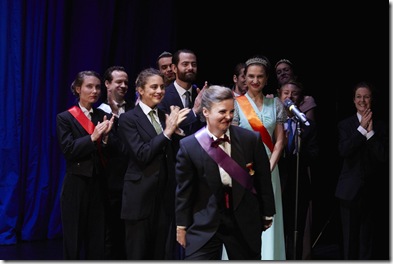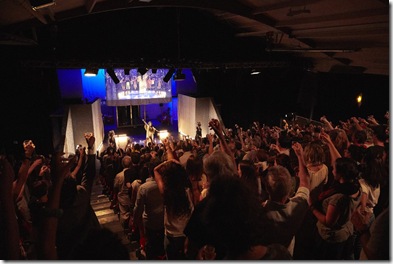Avignon: Memories of Sarajevo and Dans les Ruines d’Athènes. Symphonies of Pain, part 5.
A creation of the Le Birgit ensemble, Paris. Music by Grégoire Letouvet, Romain Maron; Set Design by Camille Duchemin, Lighting by Grégoire de Lafond, Video by Pierre Nouvel
 Photo: Christophe Reynaud De Lage
Photo: Christophe Reynaud De Lage
Memories of Sarajevo and Dans les ruines d’Athènes are the two concluding parts of the tetralogy Europe mon amour created by Julie Bertin and Jade Herbulot, the founders of the Paris based theatre company Le Birgit Ensemble.
Conceived in the genre of a nation play – defined by Michael Billington as a theatre play that takes stock of the state of the nation and instigates social change – Europe, mon amour provides an overview of European history, as it unfolded after the World War Two. Memories of Sarajevo presents an exploration of the 1992 – 1996 siege of Sarajevo, Dans les Ruines d’Athènes is a study of the recent economic collapse of Greece.
Dans les ruines d’Athènes. Photo Christope Reynaud De Lage.
Born in the mid 80s, the company’s directors and its fourteen members, present a homogeneous group of collaborators. They belong to the generation of young Europeans, who grew up affected by the new political, economic and social freedoms and who challenge the political and economic practices of the European Union.
They have no sentimental attachment to this history, they are ready to ask difficult questions and call European governments to be responsible for their failures. Le Birgit Ensemble is also unique in its professional make up, as it consists of a group of young artists, who studied together at Le Conservatoire National Supérieur d’Art Dramatique (CNSAD). They share artistic language and methods, they research and create their productions together as well. Still, the two productions presented in the Avignon 2017 were very different in style and directorial approaches.
Based on the company’s extensive research on recent historical events, archives, eye-witness accounts, and extensive interviews with the survivors of the Sarajevo siege, Memories of Sarajevo offers a re-thinking of documentary theatre. The stage presents a two-story structure with the Western and Balkan politicians appearing on its upper level and the people of Sarajevo on the lower one. The politicians are slightly caricaturized, as they serve as the examples of the company’s political irony. Although their rhetorical style is reflective of the historical events of the early 90s, Brechtian alienation brings about ironic commentary by Le Birgit Ensemble on the fruitfulness or logic of their actions. At the end, it did take Bill Clinton to intervene in European politics, to finally stop the Sarajevo massacre.
The people of Sarajevo are the victims. But unlike some documentary theatre that forces emotion through horror and sentimentality, Le Birgit Ensemble remains sombre and tactful in their portrayal of the siege. The directors acknowledge that the history they present is not fully “theirs”, and hence they must be careful in making political statements and choosing artistic tools. In this aspect, Memories of Sarajevo is truly an ensemble piece, with each performer taking on many roles, actively participating in making and re-making the stage, as the action unfolds through the whole siege.
There are songs and stories, there is love and daily danger, there is hope and despair. Occasionally, the company uses black-white video projections to show either a historical footage of the Balkan war or the Avignon audiences, who become implicated in this history by the sheer fact of attending this theatre performance.
The figure of Europe and the myth of its creation appears as an overarching symbol. Invisible to the people of Sarajevo, the presence of Europe is made significant for the overall meaning of this play. Europe appears here as a mother figure. Several times, she crosses the stage and with her ritual singing and movements, she laments the disastrous state of her children. She attempts to offer them her protection but she is only a goddess, a myth, she cannot turn back the course of the peoples’ history.
****
In Dans les ruines d’Athènes, Le Birgit ensemble continues its historical and political exploration and artistic experiments. Turning now to making fun of popular television and social media that came to define the culture of the early 2000s, they create a political satire of today’s Europe, struggling to define its identity and resolve its economic troubles in the tenets of new liberalism.
On the two-tier stage, made to resemble both a TV studio and a Corinthian temple, a Greek reality TV show takes place. Six participants, all named after famous characters of the Greek tragic canon, from Medea to Orestes, are invited to take place in the “Parthenon Story”, to win a chance to have their debts paid. The happy participants are sent off-stage, to their new home, for us to observe their actions. Live cameras off stage film the characters, as the audience observes their everyday struggles. The two happy hosts prompt spectators to use their mobile phones, to illuminate or save their favorite participants, to suggest how the candidates might improve their lives, and even to give the candidates donations.
The festive atmosphere is undercut by the action that takes place above the TV Studio – the theatre stage. There, the “Corinthian Gods,” such as Angela Merkel and Nicolas Sarkozy, are called upon to make difficult decisions such as to help Greece fight its failing economy. The action follows the historical events of 2008-2015, the dialogue is borrowed from the politicians’ speeches and actions. The course of history takes place.
On the lower level where the people of Athens are located, the action becomes more intense. As the reality show unfolds, the participants’ living conditions deteriorate. First, they lose electricity, then air-conditioning, then water. Some of them lose their minds and so on. Guy Debord’s metaphor, a society of spectacle – a society where everything is put on for the consumer’s pleasure – comes to life.
The figure of Europe intervenes in these events as well. This time, however, she is more successful. As she appears among the TV show participants, she instigates them to take action, to break away from the patronizing and controlling gaze of the TV cameras as they are identified with the role governments play in the lives of ordinary people.
The ending of the play is hopeful. Greece liberates itself from the surveying power of the European Union, the participants of the reality TV show break away. Europe sings a beautiful Greek song and the ritual of community-making takes place.
As the show reaches its final moments, the make-believe reality of this theatre/TV show is revealed, the politicians and TV hosts are thrown back under the cameras, the spectators are offered drinks, and everybody comes together in the cheering gesture of creating and sharing a new community of hope.
Although slightly naive in their political hopes and conclusions, here Le Birgit ensemble builds on the theatre’s potential to bring people together through the power of intellect and emotional affect. It is difficult not to fall under the charm of this hopeful gesture. We cheer, we laugh, we sing. We also hope that in the times of Brexists and Donald Trumps, the faith and the vigour of this new generation will indeed help resist the rising darkness of this new age.
In French
With Éléonore Arnaud, Lou Chauvain, Pauline Deshons, Pierre Duprat, Anna Fournier, Kevin Garnichat, Lazare Herson-Macarel, Timothée Lepeltier, Élise Lhomeau, Antoine Louvard, Estelle Meyer, Morgane Nairaud, Loïc Riewer, Marie Sambourg
July 9 -11, 2017
GYMNASE PAUL GIÉRA
